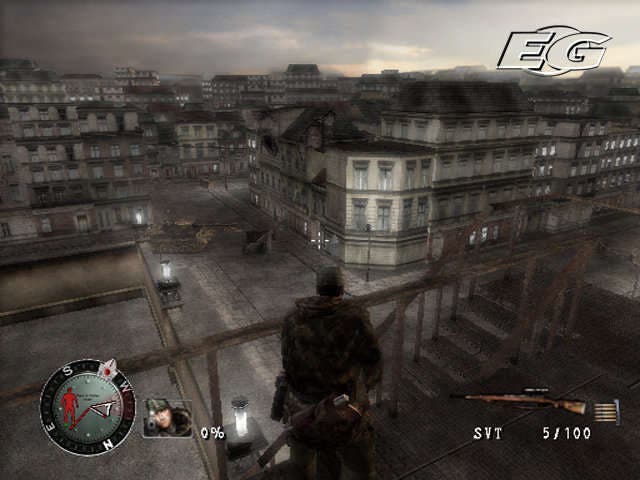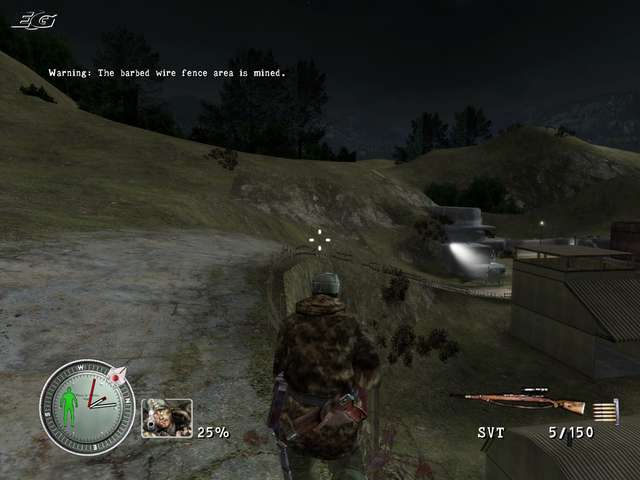Sniper Elite
We knew we'd get around to TIGA's Game of the Year in the end.
If there's one thing that's charming about the game is the sense that some of the traditional linear shackles have been taken off, making it possible to do things your way to an extent. In a way that Infinity Ward experimented with it in Call of Duty 2 recently (just after this was released in fact), you might have a bunch of buildings to clear in the general area, but which order you tackle them (and how) is largely your choice. And better still is the knowledge that no strategy is best. If you're not getting on with the stealthy, sniper-led approach and find yourself being charged down and outmanoeuvred unexpectedly, the ability to do a complete about-face, pull out the PPSch-41 and take a posse of enemy out with a machinegun or silenced P-38 pistol in a fit of impatience (or out of necessity) makes it feel a completely different game. It's not like this all the time, mind you, and you are shepherded around in many senses (and some of those invisible walls grate a bit), but you do come to learn which approach is the most effective, but it's good to see developers finally letting players take more of the initiative about how they go about doing things.
To kill or be killed
A special mention, also, for the AI, which manages to be far more convincing than many other celebrated games which make a big hoo-hah about how good theirs is (take the Conflict series, for one). In Sniper Elite enemies behave like they exist not just to kill you, but to stay alive - something of a revelation when you're used to so many games where enemies simply charge at you like cretinous maniacs on a fundamentalist suicide mission. Much of the time you'll be trying to take out foes from afar through the scope of your rifle, and as frustrating as it is to miss your target, watching their reaction is - at times - hugely convincing. Not only do they rush off and find some decent cover, they'll fire back with a convincing lack of precision, only to find their aim and force you to go to ground yourself. Some of them give you such a small window of opportunity to cap them again it becomes a real game of cat and mouse, and in a sense this is Sniper Elite's thirty seconds of fun right there. Furthermore, they'll actually gesture for reinforcements (in their native tongue), try and outflank you from different directions and even attempt to rescue the injured - giving you a perfect opportunity to pull off those tough-to-earn 'two-for-one' kill bonuses. It's one of the few military games ever released where the enemy actually provides a convincing challenge and seems to think for itself. Sadly, there are a few notable exceptions when it blots its copy book, but by and large the AI feels convincingly fallible rather than just badly designed, which is a hugely important distinction to make.
One thing we haven't really addressed so far is the focus on combos and scoring in the game - a factor that few games of this ilk bother with. With so many cool ways to take out enemies from distance, Rebellion has really gone to town with dishing out means to rack up kill combos, rewarding players for taking out moving targets, long range, covert, multiple kills and so on. Although it's nothing to do with the game objectives as such, it definitely adds a sliver of replay value - and gives bragging rights to those who want to upload them to Xbox Live. As an extra layer of achievement, such cool little stats are ace.

In terms of its technical standing, it's not a game to turn anyone's heads particularly, but it's certainly not bad either - especially once you realise how few people actually worked on the game (it was almost a side project for the Oxford-based team, by all accounts), but there's also the sense that it probably could have done with a final layer of polish to, for example, make the character models a little better, or make the levels a little less samey, or the set pieces more bombastic and impressive (as they are in the Call of Duty titles, for instance). There is a sense that within a few hours you've seen pretty much all there is to see, and that most of what follows after is pretty similar.
Admittedly, the two train station levels near the end are a break from the norm (and architecturally interesting), as is the airport, but if you've seen one bombed-out, deserted German town, you've seen them all. Just as well, then, that Rebellion did at least manage to depict such scenes of destruction with conviction, but at the same time you'll get very little (if any) reward for exploring the various bombed-out buildings, and as a whole the game does feel a little too empty for its own good (even if it was for the sake of realism). As for the storyline and narrative, this isn't really the place to come; it never stretches itself to try and make you 'care' about the characters, and any exchanges that are there tend to be all over in a sentence of grunted acknowledgement, but in a way that works in the context of the lone sniper. What you do get just about manages to neatly frame the premise without ever outstaying its welcome, and perversely you'll probably begin to feel grateful for the hollowness.
Online wasteland

For what it's worth (for a game few people are playing online) there's even some multiplayer spills to indulge in. Offline there's the two-player, split-screen co-op mode to get your teeth into, but online's really where it's at. Sadly, online co-op's not there (boo), but you can engage in a spot of free-for-all deathmatch or team deathmatch for up to eight players, with one side playing as the Russians, the other as the Germans. No Yanks or Brits in sight! Throw a party! Slightly more interesting is the Assassination mode, again for up to eight players, with the German's role as the bodyguards trying to keep their target alive for as long as possible, while the Russian's job is obviously to wipe him and their Nazi foes out. But as simple as all this sounds, the ability to tweak any number of gameplay balancing options gives you the scope (and there it is) to tailor the style of game just so, meaning everything from reload time to how realistic the sniper conditions are can be balanced in meaningful ways. Much of the fun will depend on how populated the servers are, but rounding up a bunch of like-minded pals should make for an entertaining session, with full in-game voice comms supported.
Evidently Sniper Elite deserved far better than to be slipped into an uncaring market with no marketing or retail support, but that's the reality for most games these days. From first impressions it's easy to take one look at it and assume it's a rather low-budget affair that does little that any number of other slicker, better looking titles haven't done a dozen times over. Yet what lies beneath its rather unspectacular veneer is a really well designed game that approaches the conflict from a different angle and provides a solid platform for a hugely entertaining game. Now all that needs to happen is for an ambitious publisher to expand Sniper Elites premise and fully realise its obvious potential, because the pickings would be rich if it did.
